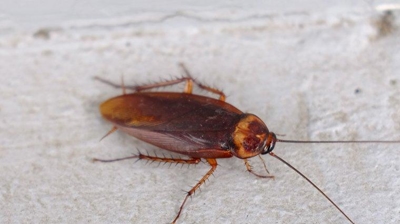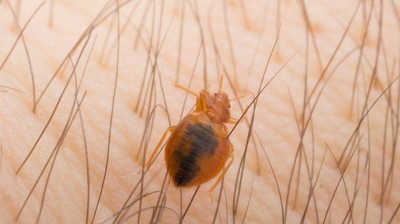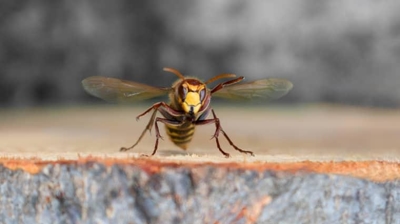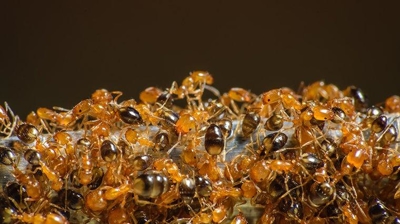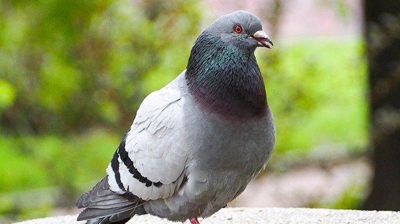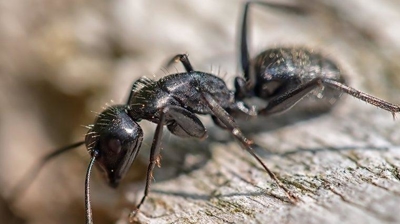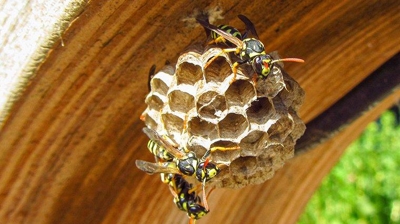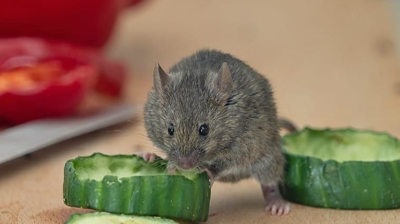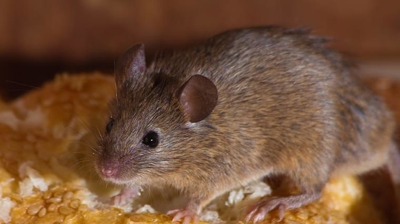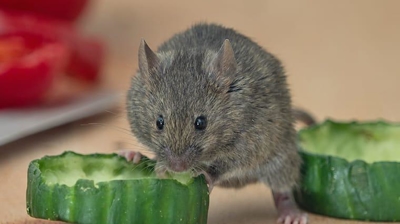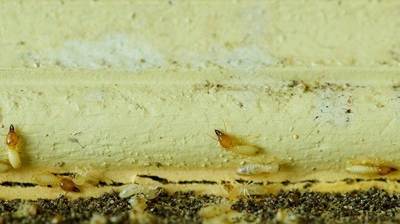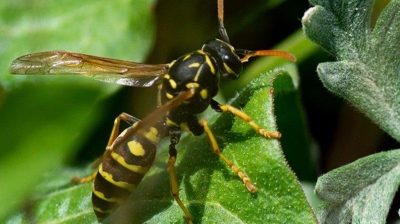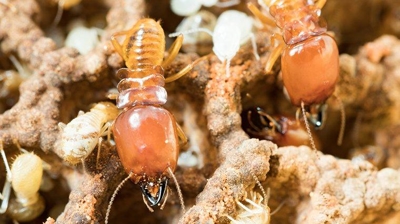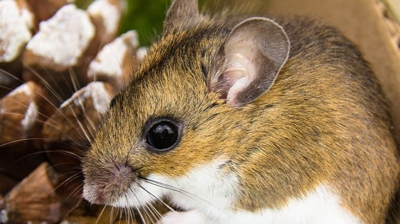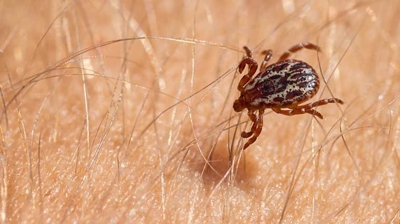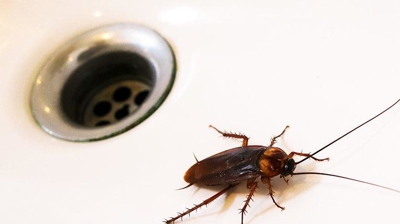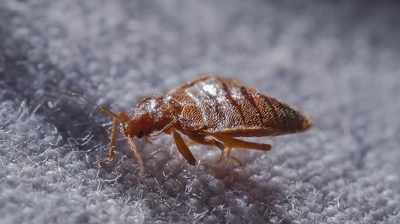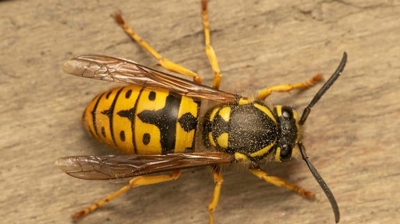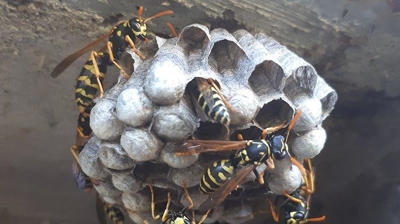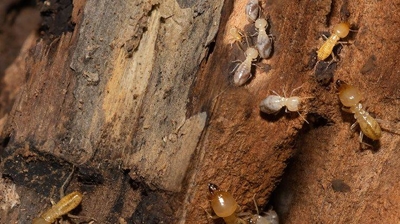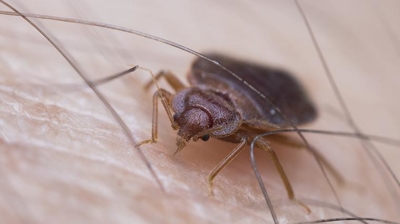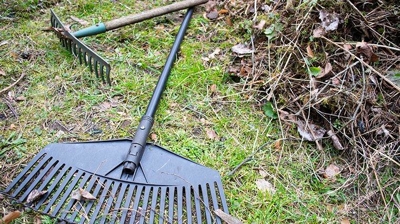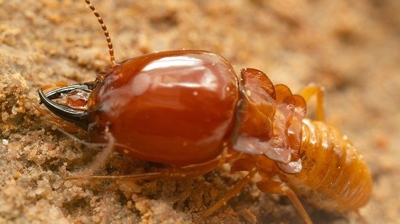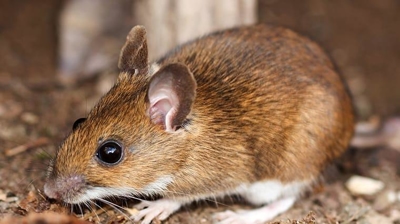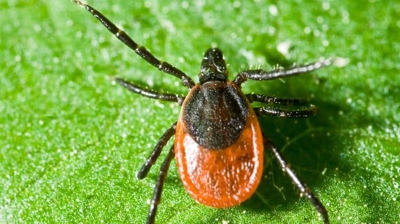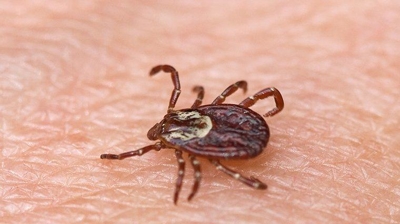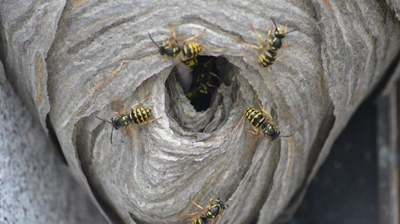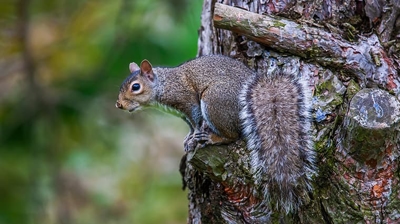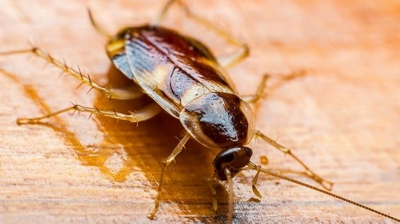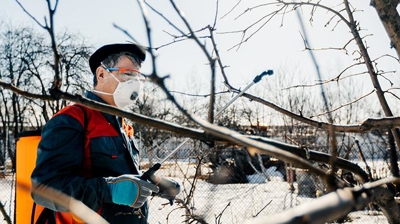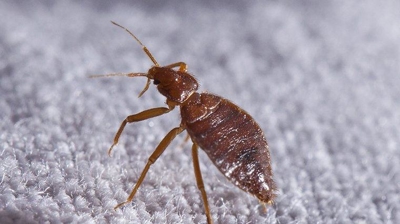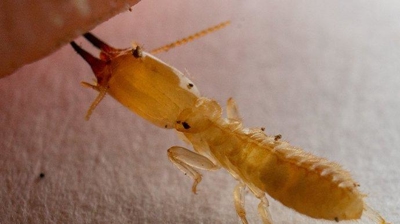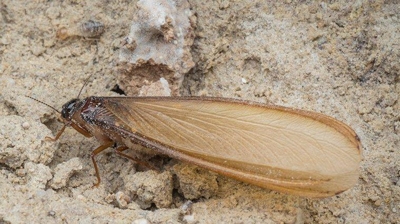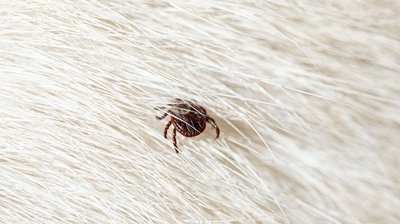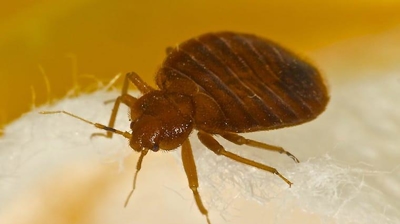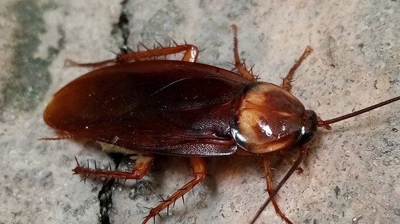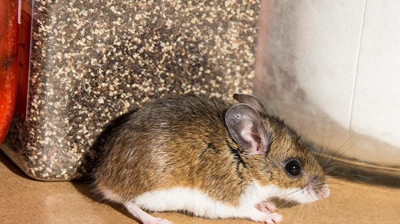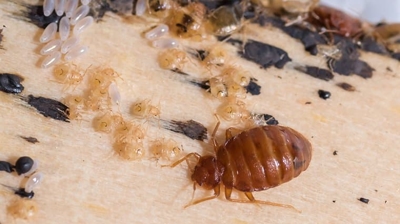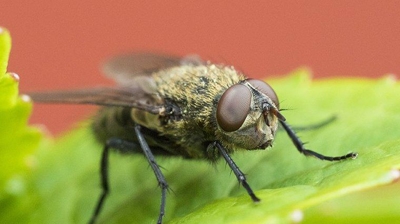
Carpenter Bee Identification Guide
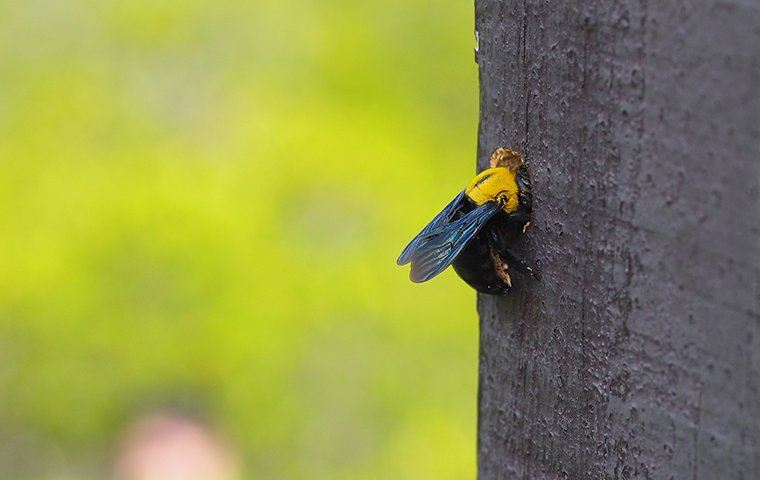
What are carpenter bees?
Carpenter bees are a large species of wood-destroying stinging insects that cause significant damage to the wooden structures they nest in. They are a large species of stinging insects with adults growing to between 1/2 and 1-1/2 inches long. Carpenter bees in New Haven have round, robust bodies that are mostly black; males have white or yellow faces. Carpenter bees are often mistaken for bumblebees but, unlike bumblebees, the abdomen on a carpenter bee is shiny and void of hair.
Are carpenter bees dangerous?
Carpenter bees tunnel inside wood to create their nesting galleries. While a single carpenter bee might not be able to cause significant damage to a piece of wood, many carpenter bees can. Female carpenter bees often pick the same area or piece of wood to nest in. Additionally, woodpeckers love to feed on carpenter bee larvae. To get to the larvae, they peck around the entry hole of the nest, damaging the wood even further.
Female carpenter bees have stingers and can deliver painful stings to defend themselves. Their venom is strong enough to trigger allergic reactions in some people. Female carpenter bees are very docile, so the main concern with these pests is the structural damage they and the woodpeckers feeding on their larvae cause.
Why do I have a carpenter bee problem?
Access to food and shelter is what attracts carpenter bees to properties. These bees nest in unfinished or weathered pieces of wood and feed on pollen and nectar; therefore, in addition to appropriate nesting sites, properties with lots of flowering plants and trees will attract these carpenter bees.
Where will I find carpenter bees?
Carpenter bees prefer to build their nests in structures made from cedar and pine such as decks, fences, wooden play structures, and outdoor wooden furniture. Carpenter bees are outdoor pests; you'll rarely see them inside your home or business, but they will nest on the exterior in wood shingles, siding, and roof eaves.
How do I get rid of carpenter bees?
Here at Connecticut Pest Elimination, our dedicated and licensed pest technicians provide the comprehensive home pest control services needed to eliminate carpenter bees and other common pests and keep them from returning! Guard your home or business against pests with the help of a local, full-service pest control company with over 27 years of experience. For more information about our residential and commercial pest control services, reach out to Connecticut Pest Elimination today!
How can I prevent carpenter bees in the future?
In addition to our professional services, the following prevention tips will help you to avoid problems with carpenter bee here in Connecticut:
- The wood used to build structures on your property should be varnished, stained, or painted.
- Do not store firewood near the exterior of your home or business.
- Install metal flashing on the end of deck boards.
- Remove fallen trees and tree stumps from your property.
- When possible, use hardwoods instead of softwoods to build structures on your property.
- Use a caulking gun to repair holes in the exterior walls, wood trim, and wood shingles on your property.

-
“A+ Experience”
“Excellent follow-through!”- Tamara S. -
“Great Work!”
“Tom was very thorough, and professional, and answered any questions I had.”- Nikki G. -
“Amazing Service!”
“Our Service from Drew was punctual, professional, honest, and polite!!”- Gretel M. -
“Great Service”
“The technician Alex explained everything he was doing and how the process works. Very courteous, called ahead to let me know when he was coming.”- Satisfied Customer -
“10/10 Recommend!”
“Sean from CT Pest Solutions was absolutely amazing. He was kind, professional, helpful, and most importantly resolved our issue.”- Samantha T. -
“Excellent Experience”
“CT Pest Elimination is a professional, knowledgeable, and courteous pest control company.”- Satisfied Customer
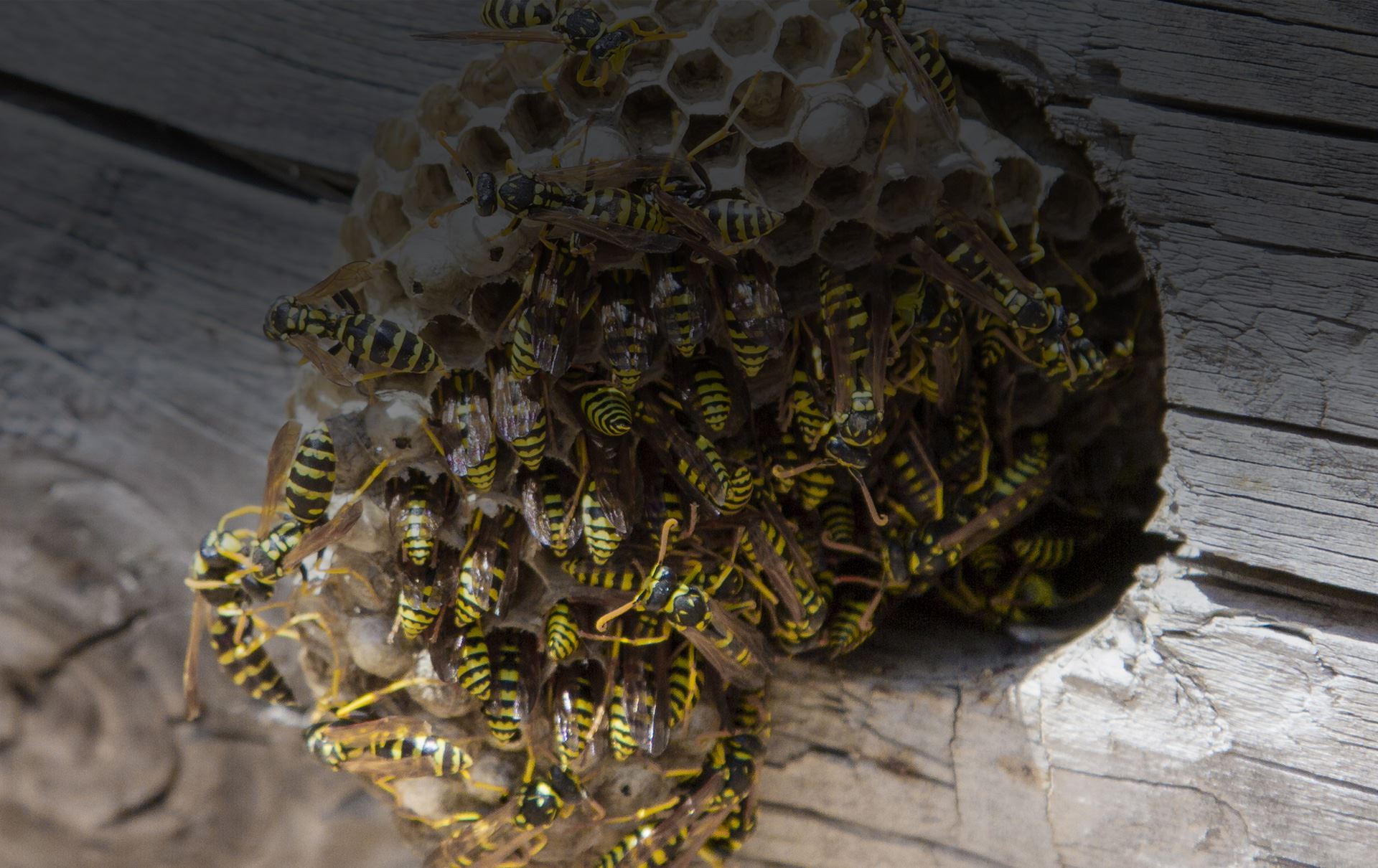
Stay in the Know!
Read Our Latest Blog Posts
-
 How Does The Cooler Weather Affect Pest Control In New Haven?Read More
How Does The Cooler Weather Affect Pest Control In New Haven?Read More -
 Why Carpenter Ants Invade New Haven HomesRead More
Why Carpenter Ants Invade New Haven HomesRead More -
 Has Wildlife Found Its Way Onto Your New Haven Property?Read More
Has Wildlife Found Its Way Onto Your New Haven Property?Read More -
 Everything New Haven Homeowners Need To Know About German CockroachesRead More
Everything New Haven Homeowners Need To Know About German CockroachesRead More -
 What New Haven Property Owners Ought To Know About Yellow Jacket ControlRead More
What New Haven Property Owners Ought To Know About Yellow Jacket ControlRead More -
 Carpenter Ants: What You Should Know And Why You Should CareRead More
Carpenter Ants: What You Should Know And Why You Should CareRead More -
 How To Keep The Nuisance Wildlife In New Haven At BayRead More
How To Keep The Nuisance Wildlife In New Haven At BayRead More -
 A Practical Guide To Carpenter Ant Control In New HavenRead More
A Practical Guide To Carpenter Ant Control In New HavenRead More -
 The Problems Wildlife Can Bring to New Haven PropertiesRead More
The Problems Wildlife Can Bring to New Haven PropertiesRead More -
 The Dangers Cockroaches Bring To New Haven HomesRead More
The Dangers Cockroaches Bring To New Haven HomesRead More -
 Carpenter Ants In New Haven Can Be A Real Problem For HomeownersRead More
Carpenter Ants In New Haven Can Be A Real Problem For HomeownersRead More -
 Commonly Told Myths About Bed Bugs In New HavenRead More
Commonly Told Myths About Bed Bugs In New HavenRead More -
 Hornet Infestations: The Dangers And How To Prevent Them In New HavenRead More
Hornet Infestations: The Dangers And How To Prevent Them In New HavenRead More -
 A Practical Guide To Dealing With Pharaoh Ants In New HavenRead More
A Practical Guide To Dealing With Pharaoh Ants In New HavenRead More -
 A Handy Guide To Wildlife Control For New Haven Property OwnersRead More
A Handy Guide To Wildlife Control For New Haven Property OwnersRead More -
 The Easiest Way To Get Rid Of Rodents In Your New Haven HomeRead More
The Easiest Way To Get Rid Of Rodents In Your New Haven HomeRead More -
 How Can I Tell If My New Haven Home Has Carpenter Ants?Read More
How Can I Tell If My New Haven Home Has Carpenter Ants?Read More -
 How To Keep Problematic Wasps Away From Your New Haven PropertyRead More
How To Keep Problematic Wasps Away From Your New Haven PropertyRead More -
 All You Need To Know About Bed BugsRead More
All You Need To Know About Bed BugsRead More -
 How A Tiny Mouse Can Cause Big Problems In Your New Haven HomeRead More
How A Tiny Mouse Can Cause Big Problems In Your New Haven HomeRead More -
 The Secret To Keeping Mice Out Of Your New Haven HomeRead More
The Secret To Keeping Mice Out Of Your New Haven HomeRead More -
 How To Easily Deter Nuisance Wildlife In New HavenRead More
How To Easily Deter Nuisance Wildlife In New HavenRead More -
 How To Protect Your New Haven Property From TermitesRead More
How To Protect Your New Haven Property From TermitesRead More -
 Are Cockroaches Invading Your Space?Read More
Are Cockroaches Invading Your Space?Read More -
 Tips To Avoid Thanksgiving Rodent Problems In StamfordRead More
Tips To Avoid Thanksgiving Rodent Problems In StamfordRead More -
 Mice And Rats In Connecticut: How Do I Prevent Them?Read More
Mice And Rats In Connecticut: How Do I Prevent Them?Read More -
 How To Spot Signs Of Termite Activity Around Your New Haven PropertyRead More
How To Spot Signs Of Termite Activity Around Your New Haven PropertyRead More -
 How To Keep Dangerous Wasps Out Of Your New Haven YardRead More
How To Keep Dangerous Wasps Out Of Your New Haven YardRead More -
 Help! I Am Struggling With A Termite Infestation In New HavenRead More
Help! I Am Struggling With A Termite Infestation In New HavenRead More -
 Rodent Rundown: Keeping These Dangerous Pests Away From Your New Haven PropertyRead More
Rodent Rundown: Keeping These Dangerous Pests Away From Your New Haven PropertyRead More -
 The Easiest Way To Get Rid Of Ticks Around Your New Haven PropertyRead More
The Easiest Way To Get Rid Of Ticks Around Your New Haven PropertyRead More -
 Winter Pest Outlook For New Haven ResidentsRead More
Winter Pest Outlook For New Haven ResidentsRead More -
 How Dangerous Are Wasps In New Haven, CT?Read More
How Dangerous Are Wasps In New Haven, CT?Read More -
 New Haven's Complete Guide To Bed Bug IdentificationRead More
New Haven's Complete Guide To Bed Bug IdentificationRead More -
 Don't Let Stinging Insects Ruin Your Fourth Of July!Read More
Don't Let Stinging Insects Ruin Your Fourth Of July!Read More -
 Mice Can Bring More Than Just A Headache To Your New Haven HomeRead More
Mice Can Bring More Than Just A Headache To Your New Haven HomeRead More -
 A Helpful Guide To Paper Wasp ControlRead More
A Helpful Guide To Paper Wasp ControlRead More -
 How To Identify And Get Rid Of Termites In Your New Haven HomeRead More
How To Identify And Get Rid Of Termites In Your New Haven HomeRead More -
 Why Are There Bed Bugs In My New Haven Home?Read More
Why Are There Bed Bugs In My New Haven Home?Read More -
 Spring Pest Prevention 101: What Every New Haven Homeowner Needs To KnowRead More
Spring Pest Prevention 101: What Every New Haven Homeowner Needs To KnowRead More -
 How To Keep Termites Away From Your New Haven HomeRead More
How To Keep Termites Away From Your New Haven HomeRead More -
 The Truth About RodentsRead More
The Truth About RodentsRead More -
 How To Deal With Ticks When You're OutsideRead More
How To Deal With Ticks When You're OutsideRead More -
 What Everyone In New Haven Ought To Know About TicksRead More
What Everyone In New Haven Ought To Know About TicksRead More -
 Stinging Insects: The Do's And Don'tsRead More
Stinging Insects: The Do's And Don'tsRead More -
 Dealing With Nuisance Wildlife: Effective Strategies For Control And Prevention In New HavenRead More
Dealing With Nuisance Wildlife: Effective Strategies For Control And Prevention In New HavenRead More -
 Are Brown-Banded Cockroaches In New Haven Dangerous?Read More
Are Brown-Banded Cockroaches In New Haven Dangerous?Read More -
 How To Completely Eliminate A Cockroach Infestation In Your New Haven HomeRead More
How To Completely Eliminate A Cockroach Infestation In Your New Haven HomeRead More -
 Don't Let Stinging Insects Ruin Your Backyard Activities In New HavenRead More
Don't Let Stinging Insects Ruin Your Backyard Activities In New HavenRead More -
 Tick Prevention Tips Every New Haven Pet Owner Should KnowRead More
Tick Prevention Tips Every New Haven Pet Owner Should KnowRead More -
 Don't Forget About Pest Control During The Winter Season In New HavenRead More
Don't Forget About Pest Control During The Winter Season In New HavenRead More -
 How To Stop Bed Bug Infestations Before They Even Begin In New HavenRead More
How To Stop Bed Bug Infestations Before They Even Begin In New HavenRead More -
 What You Should Know About Termite Season In New HavenRead More
What You Should Know About Termite Season In New HavenRead More -
 Termite Season Is Upon Us In New HavenRead More
Termite Season Is Upon Us In New HavenRead More -
 Protect Yourself & Those You Love From Ticks In New Haven, CTRead More
Protect Yourself & Those You Love From Ticks In New Haven, CTRead More -
 Top Ten Bed Bug Myths, DebunkedRead More
Top Ten Bed Bug Myths, DebunkedRead More -
 New Haven’s Step-By-Step Guide to Cockroach ControlRead More
New Haven’s Step-By-Step Guide to Cockroach ControlRead More -
 A Guide To Effective Wildlife Control In New HavenRead More
A Guide To Effective Wildlife Control In New HavenRead More -
 New Haven’s Complete Guide To Effective Rodent ControlRead More
New Haven’s Complete Guide To Effective Rodent ControlRead More -
 Beating Bed Bugs In New Haven: Strategies For Swift And Effective TreatmentRead More
Beating Bed Bugs In New Haven: Strategies For Swift And Effective TreatmentRead More -
 Protecting Your New Haven Property From Winter PestsRead More
Protecting Your New Haven Property From Winter PestsRead More









